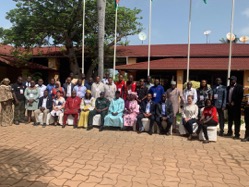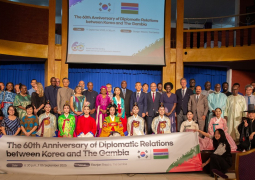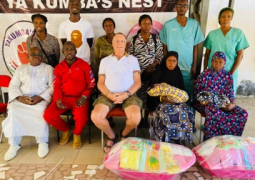
The event was held under the theme- "The Red Cross and Red Crescent Movement approach to education - a package of solutions to education needs before, during, and after crises."
The Red Cross Movement is dedicated to advancing the Sustainable Development Goals (SDG4b) "Education for all," particularly for those most at risk of losing access to education, by providing quality education; ensuring safe, equitable, and continuous access to education; and protecting education from all hazards and ensuring a safe and supportive learning environment, and strengthening the resilience of education systems and communities.
Also, the workshop seeks to broaden and strengthen the movement’s community of practice and response to education in emergencies by providing an opportunity for peer exchange and learning- sharing of operational experience and good practice. It is further exploring new opportunities in the different national societies; enhancing and applying technical knowledge and skills in EiE with a focus on protection in and of education; improving communication on and advocacy for education in emergencies and the movement’s role.
Participants include representatives from Benin, Burundi, Comoros, Guinea Bissau, Guinea Conakry, Chad, DR Congo, Eswathini, Central Africa Republic, Ivory Coast, Nigeria, Namibia, Rwanda, Sudan, South Sudan, Tanzania, Uganda, Zimbabwe and The Gambia. Facilitators from IFRC, the Norwegian Red Cross were also in attendance.
Mariama Chaw, a representative of the Minister of Basic and Secondary Education, revealed that in The Gambia, as in many parts of Africa, the challenges our education system faces during emergencies are significant.
“Whether due to natural disasters, health crises, or other unforeseen circumstances, the impact on our children's education can be profound and long-lasting.”
The forum, she added, provides a crucial platform to address those challenges head-on and to explore innovative solutions that can ensure the continuity of education in times of crisis.
She thus expressed government’s commitment to implementing policies and frameworks that prioritise the safety and education of our children, even in the most challenging situations.
That, she said, includes investing in resilient educational infrastructures, providing training for teachers on emergency response, and ensuring that their curriculum incorporates essential life-saving information and psychosocial support.
“Quality education during emergencies is not just about keeping children in school; it is about providing a safe haven where they can learn, grow, and heal,” she said.
Fabakary Kalleh, president of The Gambia Red Cross Society (GRCS), said the event underscores their unwavering commitment to the educational welfare of children and youth, especially in times of crisis.
He expressed GRCS’s commitment to advancing the cause of Education in Emergencies (EiE).
Kalleh noted that Education in Emergencies is not just keeping children in school, saying it is about ensuring that education continues to be a beacon of hope and a source of stability in the midst of chaos.
He highlighted that schools and other learning environments can offer a sanctuary where children receive not only academic knowledge but also psychosocial support, protection, and essential life skills.
He also expressed the Gambia Red Cross Society’s readiness to work hand in hand with the Ministry of Basic Education, IFRC, partner national societies and communities to ensure that every child in The Gambia has access to quality education, even in the face of emergencies.
Njogou Jeng, National Society Development Officer for IFRC, expressed IFRC is deeply committed to education in emergencies, recognising its crucial role in mitigating the impact of crises on individuals and communities.
“Education must be invested in as it is key to the realization of all human rights and Sustainable Development Goals. Greater investment in humanitarian education is essential for new generations to develop the mindset, attitudes, and skills needed for resilience and lasting peace,” said Jeng.
He pointed out that education is not just a lifeline during crises but a cornerstone of protection. He noted that by prioritising education before, during, and after crises, they help to ensure preparedness, build pathways to resilience, and equip people with the skills needed to build back better.




